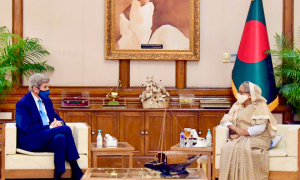John Kerry, the special U.S. envoy on climate, said on April 9 that President Joe Biden is eager to work with Bangladesh in dealing with the impact of climate change after the United States’ return to the Paris accord.
Kerry arrived in Bangladesh’s capital, Dhaka, to hear what the low-lying South Asia delta nation has done to cope with weather extremes and rising sea levels ahead of a virtual summit on climate change that Biden is hosting this month.
“No one country can solve the problems of climate crisis,” he told reporters after visiting other vulnerable countries, including the United Arab Emirates and India. Biden returned the United States to the Paris agreement on climate change after former President Donald Trump announced a withdrawal in 2017.
“We’ve the ability to work together now in order to bring technology, research, development and finance to the table to do what we know we must do,” Kerry said.
Bangladeshi Foreign Minister A.K. Abdul Momen, who appeared with Kerry, took the opportunity to ask for U.S. help in repatriating about 1.1 million Myanmar Rohingya refugees from crowded camps in the border district of Cox’s Bazar, saying they were destroying vast areas of forests.
“We hope that (the) U.S.’s proactive initiative can help them for a safe and dignified return, back to their country for a decent living,” he said.
The refugees are victims of widespread persecution in Myanmar, where the military toppled a civilian government in a February 1 coup, and most say it’s unsafe to return.
Kerry also called on Prime Minister Sheikh Hasina, who discussed Bangladesh’s interest in producing more hydroelectric power, press secretary Ihsanul Karim said.
Karim said Hasina added that the country’s farmers need solar energy for irrigation to reduce the emission of greenhouse gases.
Momen said earlier that Bangladesh has not sufficiently adapted for climate change and needs support from others. “It should be Kerry’s special target,” he was quoted as saying by the United News of Bangladesh news agency.
He said the countries that are most responsible for greenhouse gas emission should share responsibility for protecting the people vulnerable to the impact of climate change.
In the UAE, the government says the impact of warmer weather, less rain, droughts, higher seas and more storms is taking its toll on infrastructure, human health and the natural habitat. Kerry heard of similar challenges in talks with Indian Prime Minister Narendra Modi in New Delhi on Thursday, the State Department said.
Bangladesh, a nation of 160 million people, shares the same predicament.
Some experts warn that rising sea levels could devour much of its vast coastal region, and cyclones and tidal surges destroy agriculture and livelihoods for millions. The world’s largest mangrove forest, Sundarbans, which straddles the border of Bangladesh and India, is especially vulnerable and its famous Bengal tigers are at risk.
The State Department said Kerry and Modi focused on mobilizing funds to support expansion of clean energy, cooperation in emerging technologies such as for energy storage, clean industrial processes, and sustainable urbanization and agriculture.
Biden has invited 40 world leaders for the April 22-23 summit, including Prime Minister Hasina.

































